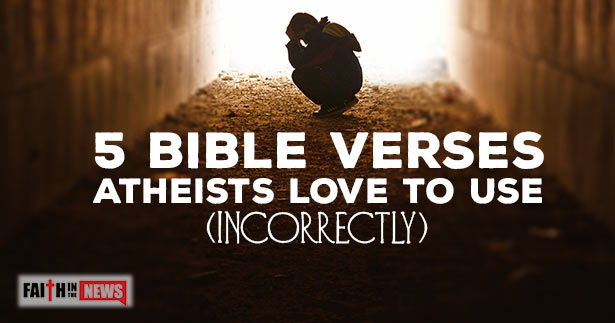Here are five Bible verses that atheists love to use incorrectly.
Ecclesiastes 1:2-3 “Vanity of vanities, says the Preacher, vanity of vanities! All is vanity. What does man gain by all the toil at which he toils under the sun.”
When non-believing people read this, they believe that Solomon was saying there is no meaning to life. If there is no meaning to life, how can there be a God? Context is always king in reading Scripture. Vanity means “meaninglessness,” but Solomon tells us the very conclusion and the summation of the Book of Ecclesiastes: “The end of the matter; all has been heard. Fear God and keep his commandments, for this is the whole duty of man. For God will bring every deed into judgment, with every secret thing, whether good or evil” (Eccl. 12:13-14).
Luke 14:26 “If anyone comes to me and does not hate his own father and mother and wife and children and brothers and sisters, yes, and even his own life, he cannot be my disciple.”
The context of this verse is when Jesus was speaking to the large crowds that began to follow Him. He was speaking about the cost of discipleship (Luke 14:26-33), and He said whoever it is “who does not renounce all that he has cannot be my disciple” (Luke 14:33). Jesus demanded such an overwhelming devotion to Him that it would look like hate toward their family by comparison.
Matthew 7:1 “Do not judge lest you be judged.”
This text is often taken out of context to mean we can’t judge anyone for anything. But if that’s the case, what are the courts, police, judges, and prisons for? Every one of us makes a judgment almost every day. Yes, we must make some judgments of people. For example, we might judge if someone’s not a good fit as a babysitter, which is a good thing! If you read elsewhere, Jesus doesn’t say we’re not ever to judge anyone but says, “Do not judge by appearances, but judge with right judgment” (John 7:24). Judging by appearances can be difficult, but with right judgment, based upon what you know the Bible teaches, you can hopefully make a “right judgment.”
Ecclesiastes 3:19 “For what happens to the children of man and what happens to the beasts is the same; as one dies, so dies the other. They all have the same breath, and man has no advantage over the beasts, for all is vanity.”
This is also taken out of context because Solomon wasn’t writing about what happens after death but that death happens to all created creatures. The statistics on death are impressive: One out of every one will die…eventually. Just like animals, we too will die, or as Solomon wrote, “All go to the same place; all come from dust, and to dust all return.” However, Solomon believed in God and knew that He requires a life of obedience and sacrifice. Death does not mean annihilation because “God will bring every deed into judgment” (Eccl. 12:14a).
Matthew 18:9 “And if your eye causes you to sin, tear it out and throw it away. It is better for you to enter life with one eye than with two eyes to be thrown into the hell of fire.”
Atheists love this verse, too, because it proves that we can’t read the Bible literally. However, what they fail to see (or read) is that Jesus was speaking in hyperbole (extreme exaggeration to make a point) and was essentially saying, “Whatever it takes, whatever it costs, rid yourself of this ongoing sin,” or take as extreme measures as possible.
Conclusion
Jesus also had many other sayings that atheists take out of context, like in Matthew 5:21-22: “You have heard that it was said to those of old, ‘You shall not murder; and whoever murders will be liable to judgment.’ But I say to you that everyone who is angry with his brother will be liable to judgment; whoever insults his brother will be liable to the council; and whoever says, ‘You fool!’ will be liable to the hell of fire.” But whenever they use a text as a proof text, they have taken it out of context and made it a pretext–and a false one at that.
May God richly bless you,
Pastor Jack Wellman
Republished by Blog Post Promoter
 Faith in the News Christian News
Faith in the News Christian News



